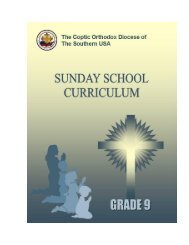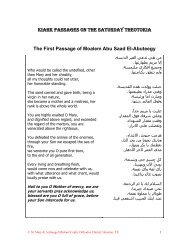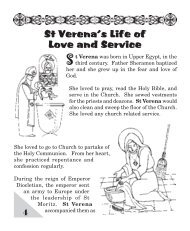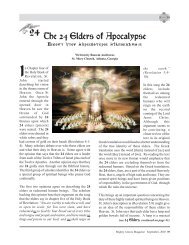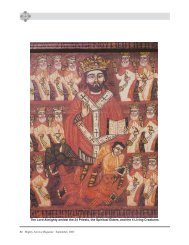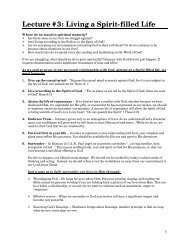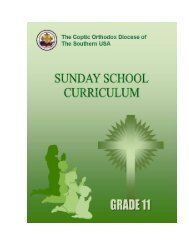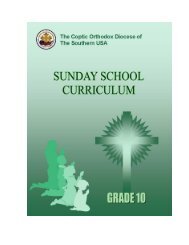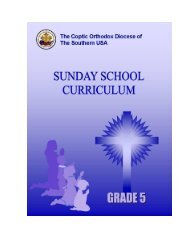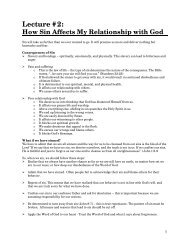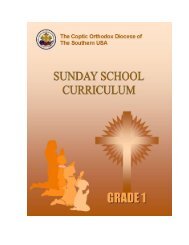Grade 12 - Coptic Orthodox Diocese of the Southern United States
Grade 12 - Coptic Orthodox Diocese of the Southern United States
Grade 12 - Coptic Orthodox Diocese of the Southern United States
Create successful ePaper yourself
Turn your PDF publications into a flip-book with our unique Google optimized e-Paper software.
Sunday School Curriculum <strong>Grade</strong> <strong>12</strong><br />
9. Colossians: Sufficiency <strong>of</strong> Christ<br />
10. Philemon: In God, all are family<br />
E. Pastoral Epistles<br />
11. 1 Timothy: Affirmation <strong>of</strong> <strong>the</strong> truth in Christ<br />
<strong>12</strong>. 2 Timothy: Faithfulness to Christ<br />
13. Titus: Standards for serving Christ<br />
14. Hebrews: Superiority <strong>of</strong> Christ over Judaism<br />
Lesson Outline:<br />
I. Romans<br />
The Epistle to <strong>the</strong> Romans was written from Corinth around AD 55-57. It was not written to<br />
address specific problems within <strong>the</strong> Church <strong>the</strong>re, but ra<strong>the</strong>r it was written as a treatise.<br />
A. The purpose for writing Romans<br />
To guard <strong>the</strong> Church against <strong>the</strong> Judaism. The Judaism was a group <strong>of</strong> Jews who believed that<br />
Jesus Christ was a mere addition to <strong>the</strong> Law <strong>of</strong> Moses, and not a fulfillment <strong>of</strong> <strong>the</strong> Old<br />
Testament and a beginning for <strong>the</strong> New Testament.<br />
As a last will and testament.<br />
To get <strong>the</strong> Romans to support his planned mission to Spain.<br />
To replace a visit he might never make. St. Paul writes <strong>the</strong> Epistle to <strong>the</strong> Romans in case he is<br />
martyred in Jerusalem when he goes and gives <strong>the</strong> leaders <strong>of</strong> <strong>the</strong> Church <strong>the</strong>re <strong>the</strong> <strong>of</strong>fering,<br />
which he has collected from <strong>the</strong> Gentiles.<br />
B. The <strong>the</strong>me for <strong>the</strong> Epistle to <strong>the</strong> Romans<br />
It is stated in Romans 1:16,17. The righteousness <strong>of</strong> God is for salvation to those who believe in<br />
Christ Jesus. We are not attached to God on <strong>the</strong> basis <strong>of</strong> our righteousness, but we live in His<br />
righteousness. There is no basis for legalism. St. Paul also questions <strong>the</strong> Romans: how can we<br />
continue to sin if we have already died to sin?<br />
II. First Corinthians<br />
The first Epistle to <strong>the</strong> Corinthians was written from Ephesus around AD 55-56. The epistle was<br />
written to address many problems in <strong>the</strong> Church such as: factions and divisions, wisdom movement,<br />
ethical conduct (<strong>the</strong> incestuous relationship in Church), eating food sacrificed to idols, marriage and<br />
celibacy, women‘s participation in worship, participating in <strong>the</strong> Lord‘s Supper properly, spiritual<br />
gifts, and <strong>the</strong> issue <strong>of</strong> resurrection.<br />
III. Second Corinthians<br />
The second recorded Epistle to <strong>the</strong> Corinthians was sent by Titus.<br />
A. The problems that led to <strong>the</strong> writing <strong>of</strong> 2 Corinthians<br />
Some outsiders entered <strong>the</strong> Church <strong>of</strong> Corinth and started preaching a kind <strong>of</strong> Judaism.<br />
Certain believers called <strong>the</strong>mselves super apostles and used Moses as <strong>the</strong>ir only example.<br />
Super apostles turned <strong>the</strong> Corinthians against St. Paul saying that he was not impressive in<br />
appearance, speech, or word.<br />
THE GREAT FAST 131



